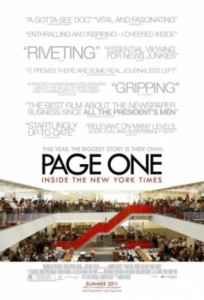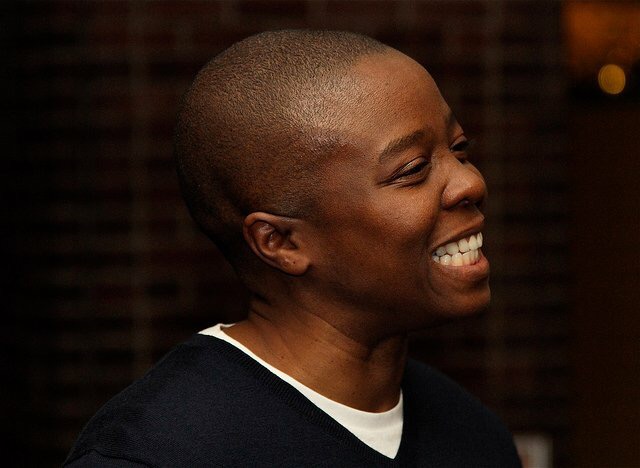 Directed by Andrew Rossi
Directed by Andrew Rossi
Written & Produced by Kate Novack & Andrew Rossi
Released by Magnolia Pictures
USA. 88 min. Rated R.
[Article originally appeared: http://film-forward.com/pageone.html]
Did The New York Times sound a death knell when they began charging subscriptions for online readers a few months ago? The jury is still out on that one, and it’s one of the many issues that Andrew Rossi highlights in this fascinating documentary. Given unprecedented access to the venerable paper (established in 1851), Rossi had the opportunity to film inside “The Gray Lady” during arguably one of the newspaper’s most crucial periods. As other major metropolitan newspapers have claimed bankruptcy and folded, The New York Times struggles to keep sales up while seeing ad revenue dwindle. The decrease in advertising was so swift and abrupt as to have caused a whiplash effect for the company. Not to say the publication wasn’t already taking necessary measures to remain both fluid and relevant. Reaching out across all media platforms was one method, encouraging 100 employees to take early retirement packages was another.
Rossi follows several journalists but mainly, and wisely, focuses on two. Both work for the relatively new media desk. The first is David Carr, former crack addict and welfare dad. His history is well noted in both his memoir, The Night of the Gun, and also in his candid openness about his past. Somehow, even amidst all his personal drama, he was able to function as a journalist, and after he cleaned up, he impressively snagged a job at the Times. Since then he has become the paper’s staunchest advocate, fiercely defending the institution at various media conventions and panels. Carr, at first a reluctant blogger and Twitter user, has become an unleashed attack dog, fiercely defending his home turf and his masters. And while he proves most effective in this role, it is not at the cost of his role as a journalist. During the course of filming “Page One”, Carr covers the financial fall of the Tribune Company. Just surreptitiously watching Carr questioning a source from the organization makes for a riveting moment.Media writer Brian Stelter lost some 90 pounds over the filming of the documentary. Founder of the blog TVnewser.com, the Times outed the once anonymous blogger and then hired him shortly thereafter. On camera, Stetler focuses on another timely breaking story, WikiLeaks, specifically the leaked video footage from the Iraq War where civilians are thought to have been murdered by American soldiers. Working closely with his editor, Bruce Headlam, Stetler, too, comes across as an amazingly deft and intellectual individual. One might argue that “Page One” is nothing more than an extended advertisement for the newspaper, and there might be some validity in that criticism, but Rossi’s film also emphasizes the fact that the standards set by the Times is as yet unmatched. The Times is necessary.
There’s much more to the film, but it’s Carr’s and Stelter’s stories that tell the broader picture of how today’s media has become so diluted. The Times still represents the commitment to cut through the morass, but the vehicle for its well-researched investigative content may not necessarily be in a printed newspaper. As more and more people rely on tablets and phones for their news, it’s clear that The New York Times—all the media for that matter—is in a period of transition. Where things will end nobody really knows, though I’d still like to ask Stelter for his opinion.





